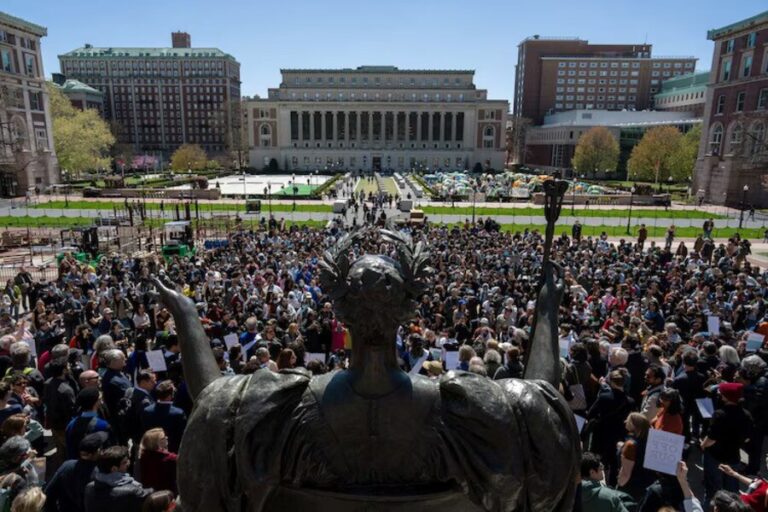Columbia University has formally complied with a series of demands issued by the Trump administration after facing the potential loss of $400 million in federal grants and contracts. The move follows mounting pressure over allegations that the Ivy League institution failed to adequately address the harassment of Jewish students during and after pro-Palestinian campus protests.
In a four-page memo titled “Advancing Our Work to Combat Discrimination, Harassment, and Antisemitism at Columbia,” the university outlined significant policy changes and structural reforms. These changes were delivered days before a Thursday deadline set by the U.S. Department of Education, which had warned the university that non-compliance would halt negotiations and result in the withdrawal of federal funding.
The Trump administration’s ultimatum listed nine requirements that Columbia needed to meet. Among the most notable: banning face masks at protests, revising oversight of its Middle East Studies department, and forming new advisory bodies to address academic freedom and antisemitism on campus.
One of the administration’s central demands was the implementation of a ban on masks used to conceal identities during campus demonstrations. Columbia announced it has adopted a new policy prohibiting face coverings intended to obscure identity in any activity that violates university policies or laws.
“Public safety has determined that face masks or face coverings are not allowed to conceal one’s identity in the commission of violations of University policies or state, municipal, or federal laws,” the university stated.
The rule is expected to curb anonymity in campus protests, especially those surrounding politically charged topics such as the Israel-Palestine conflict. While some students argue the policy will stifle protest participation, university officials maintain it is necessary to ensure campus safety and accountability.
Another major development involves Columbia’s Middle East Studies department, which will now undergo a comprehensive review. The university will install a newly appointed senior vice provost to oversee all regional studies programs, beginning with the Middle East. The Trump administration had raised concerns about alleged anti-Israel bias and one-sided narratives in academic content.
According to the memo, the new vice provost will assess the curriculum and ensure that it reflects “a comprehensive and balanced” perspective. The university also pledged to maintain an “intellectually diverse academic environment” among its faculty.
This move comes amid heightened national attention on how Middle Eastern topics are taught in U.S. universities and reflects a broader ideological push by the administration to combat what it calls “left-wing dominance” in academia.
In a bid to reinforce its commitment to free speech while addressing community concerns, Columbia also announced the formation of the Provostial Advisory Committee on Academic Freedom and Freedom of Expression. The committee will advise the administration on university policies and help ensure decisions align with institutional values.
“The committee members will serve as trusted advisors, both to consult on university policies and procedures and to ensure that our decisions are consistent with our values,” Columbia’s statement read.
The university says the group will play a critical role in balancing the rights of students to express themselves with the university’s responsibility to protect individuals from harassment or intimidation.
Columbia will also establish a commission to investigate campus events that have occurred since October 7, 2024, marking the one-year anniversary of the Israel-Hamas conflict. The panel is tasked with conducting a detailed analysis of campus activities, protests, and reported incidents of discrimination.
The commission’s report will offer insights into the “underlying causes” of unrest and recommend corrective measures to ensure that all students, regardless of background or beliefs, can pursue academic success without disruption or hostility.
Columbia emphasized that individuals who engaged in behavior that hindered academic pursuits would be held accountable.
The university’s concessions mark a significant moment in the ongoing national debate over free speech, protest culture, and the role of federal influence in higher education. Columbia, one of the nation’s most prestigious institutions, is now viewed as a test case for how schools may respond to federal pressure under the Trump administration.
Similar demands could potentially be levied against other universities facing scrutiny over campus activism, especially those seen as insufficiently responsive to reports of antisemitism or anti-Israel sentiment.
For the Trump administration, Columbia’s compliance is seen as a policy victory. Officials claim the university’s response validates their efforts to hold academic institutions accountable for fostering what they describe as “toxic environments” for Jewish students.
However, civil liberties advocates and faculty unions have expressed concern that the federal government is overstepping its authority, jeopardizing academic independence in the process.
Student responses to the announcement have been sharply divided. Some Jewish student groups welcomed the changes, describing them as necessary to address persistent antisemitism on campus. Others, including pro-Palestinian and civil rights activists, condemned the move as a capitulation to political coercion.
“It feels like the administration is prioritizing funding over student rights,” one student protester said anonymously, citing the mask ban as particularly troubling. “We are being silenced under the guise of safety.”
University officials maintain that the reforms are aimed at promoting inclusivity and fostering respectful dialogue, not suppressing protest.
As Columbia implements these changes, administrators are closely watched by federal officials and peer institutions. Whether these reforms will succeed in reducing tensions on campus or ignite further backlash remains uncertain.
It is clear that the federal government’s role in shaping university policy has grown more pronounced—and institutions that rely on federal funding may find themselves navigating a new and politically charged landscape.
Columbia’s decision to comply reflects the enormous influence that Washington can exert on academia when funding is at stake. With $400 million hanging in the balance, the university has opted to comply—but not without stirring national debate about the future of higher education, freedom of expression, and the limits of federal power.
